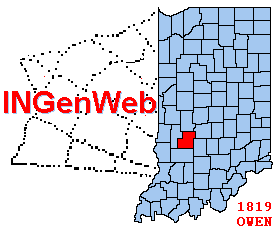Fowler, Inman H.
Inman H. Fowler, attorney at law, Spencer, was born at Lewisburg, Preble County, Ohio, June 7, 1834. He is the son of John and Sarah Fowler. His great grandfather, Jacob Fowler, came from Germany to this country about the year 1750. Jacob and his brother Adam were brought over by an aunt, when they were quite young. The aunt settled near Haddenfield, N.J., and there the two boys were hired out for awhile to pay for their passage over; and there they grew to manhood, spent their lives, married, reared large families, many of whom yet live in and around Haddenfield, and there they both died and were buried not far from the town where they first settled. Jacob Fowler married an English lady by the name of Sarah Inman, whose maiden name the subject of this sketch bears. They had ten children - seven boys and three girls. Joseph Fowler was the oldest child. He married a lady near Haddenfield, by the name of Hannah Wiltse, and by this union there were ten children.
John Fowler, the father of Inman H. Fowler, was born January 1, 1808 and was the eldest child of Joseph and Hannah. Joseph Fowler and his son John were both born in Haddenfield. Joseph afterward removed to Philadelphia with his family, and from thence to Lewisburg, in Preble County, Ohio, where he and his wife died. January 1, 1831, John Fowler married Sarah Kesler, daughter of George and Catharine Kesler, of Lewisburg. They were natives of Virginia, and moved to Ohio in a very early day. Sarah was born in Virginia September 8, 1810, and came to Ohio with her parents. John and Sarah had five children, four boys and one girl. Inman H. was the third son.
In 1836 John Fowler with his family moved from Lewisburg to Tippecanoe County, Ind. He remained there but a short time when he moved to Louisa County, Iowa. At this time Iowa was a frontier Territory, inhabited only by Indians. August 25, 1839, the father of Inman H. died, and on the 19th of September following, an older brother died. After this the mother with the balance of the family returned to Tippecanoe County, and settled on a farm, and from there she moved to Clinton County where she yet resides. Mr. Fowler having been thrown upon his own resources at a very early day in life, had to struggle with many adverse fortunes; yet he availed himself of every opportunity to acquire an education, which he did by alternately teaching and attending school. In 1858 he moved to Owen County and settled at Spencer, having taught school in that town the first year after he came to the county. In 1859 he entered the Clerk's office of the Owen Circuit Court as Deputy Clerk, under Basil Meek, Esq., in which position he remained for two years, and until the expiration of Mr Meek's term of office.
On the 4th day of July, 1861, Mr. Fowler was nominated by the Democratic Convention of Owen County, for Clerk of the Circuit Court, to succeed Mr. Meek. His opponents before the convention were Philip Buck, of Quincy, and William S. Bullett, of Cataract. On the first ballot, Mr. Fowler was nominated, receiving all the votes in the convention but five. His opponent before the people was John J. Cooper, Esq., who had just served eight years as Auditor of the county, and whose name had become a household word in every family in the county. The race was regarded as a very doubtful one. Mr. Cooper had made a very fine Auditor, was very popular with his party, was conservative, and had a host of warm personal friends among the Democrats. The war of the rebellion had just broken out. The whole nation was in a blaze of excitement; party spirit ran high; life-long friends engaged in personal abuse of each other, and in bitter denunciation and arraignment. The election came off; the Democrats were successful, and the entire Democratic ticket was elected.
In 1865, just at the close of the war, Mr. Fowler was re-nominated for a second term without opposition. The Republican candidate for Clerk was Maj. Harry Woodsmall, a clever and gallant gentleman who had served in the army with honor and distinction, and came home, unable longer to continue in the service, owing to the wounds which he had received in battle. Again the Democratic ticket was successful, and Mr. Fowler was re-elected to a second term. Those who remember the canvass of 1861 and the canvass of 1865, remember them as the most remarkable in the history of Owen County politics. Excitement and party zeal were such as has never been witnessed in Owen County in any political canvass before or since. Mr. Fowler served as Clerk till the 28th day of October, 1870, having held the office for one year longer than the term for which he was elected. This was owing to the fact that the Legislature, at its session in 1869, changed the elections from annual to biennial. Mr. Fowler's term would have expired in the fall of 1869, if there had been an election, but there being no election till the next fall, he held over till after his successor was elected at the October election in 1870. Meantime he improved his spare time in reading and preparing himself for the practice of law, having determined to make that his profession in life, and to make every other interest subservient to that one purpose.
After he had retired from the clerk's office he immediately entered the law department of the State University, where he graduated in 1871, in a class of thirty-two, the largest law class ever graduated from that institution. He returned to Spencer, and entered upon the practice of the law in partnership with the Hon. John O. Rolinson. This partnership continued till the fall of 1877, when Mr. Rolinson was elected Judge of the Fifteenth Judicial Circuit, and at the same election Mr. Fowler was elected State Senator for the Senatorial district, composed of the counties of Owen and Clay. His opponent in this political contest for Senatorial honors was Dr. David M. McDonald of Quincy, a cultivated and scholarly gentleman, and a son of the late Federal Judge, David McDonald, and although the district was a close one, and the contest regarded as doubtful, Mr. Fowler's majority in the two counties was 700. He was a member of the Senate during the regular and special sessions of 1877, and during the regular and special sessions of 1879.
During his Senatorial term, he was an active, energetic and working member of that body. He was placed on some of the most important committees, regular and special, in the Senate, and always had an eye single to the interests of his constituents. Some of the most important bills introduced at these sessions were framed by his hand, and many of which afterward became laws, and are yet upon the statute books of the State. One of the bills which he succeeded in getting through the Senate, and which became a law, was a bill originating in the House of Representatives, and was to compel operators to ventilate their coal mines. This bill, for four or five previous Legislatures, had passed the House of Representatives, but met with bitter opposition and defeat in the Senate. At the regular session of 1879, after the bill had passed the House, it came to the Senate, and was taken in charge by Senator Fowler, and although there was an organized opposition by the operators, yet after a heated and bitter contest, it passed the Senate, was approved by the Governor and became and yet is a law. This was one of the most humane acts passed at that session of the Legislature, and was in the interest of a large class of miners working the coal mines throughout the State, where lives were in constant and imminent danger from accumulations and explosions of noxious gases in the mines.
In 1875, Mr. Fowler, with several other stockholders, organized the Exchange Bank of Spencer. At the time of its organization he was elected Vice President and Attorney for the bank, which positions he has ever since held, and the success, standing, and confidence enjoyed by the bank are largely due to his management of its finances. Mr. Fowler is just at the meridian of life, and in the full vigor of manhood, and although nearly fifty, he would pass for a man of not more than forty or less. He is actively engaged in the practice of law, in which he takes great pride. He is industrious and painstaking, and when he addresses court or jury, he knows just what he wants to say; and the zeal, energy and ability with which he represents his clients has given him a prominent place at the bar wherever he practices. He is a Mason, an Odd Fellow, and a Knight of Pythias. September 20, 1866, he married Miss Vina H., daughter of A. A. and Emily Hollembeck, of Springboro, Penn. They have had four children, only two of whom are living - Edna and Frederick H. In politics, Mr. Fowler is a Democrat, and believes in the integrity of the principles of that party. He is a man of spare and slender make-up, but possesses a constitution of great vitality, with indomitable energy, zeal and perseverance, meeting and surmounting all obstacles that come in his way. Whatever he undertakes is undertaken in no sluggish manner, but with a view to success. Possessing all these rare faculties, it is not to be wondered if he has made a success in the journey of life.
Source: Counties of Clay and Owen, Indiana: Historical and Biographical, 1884. Edited by Charles Blanchard



